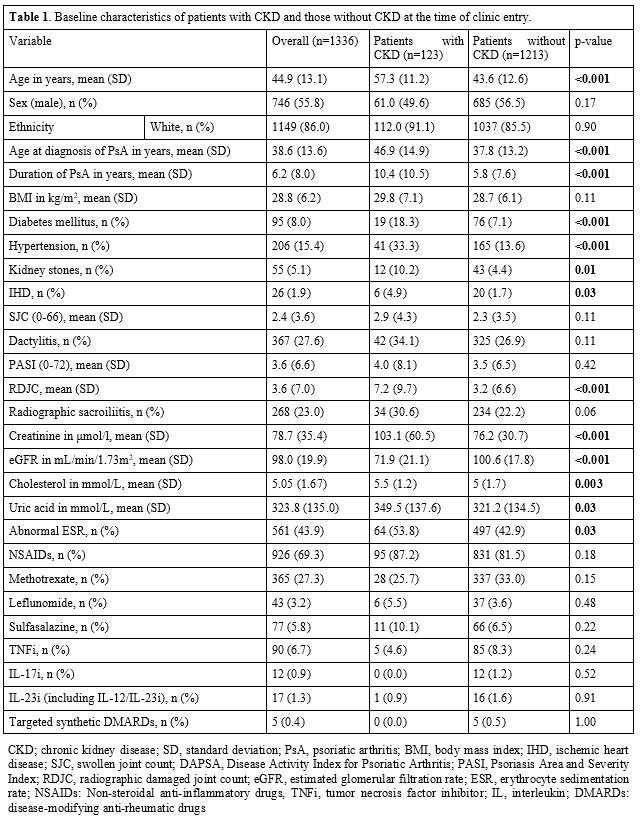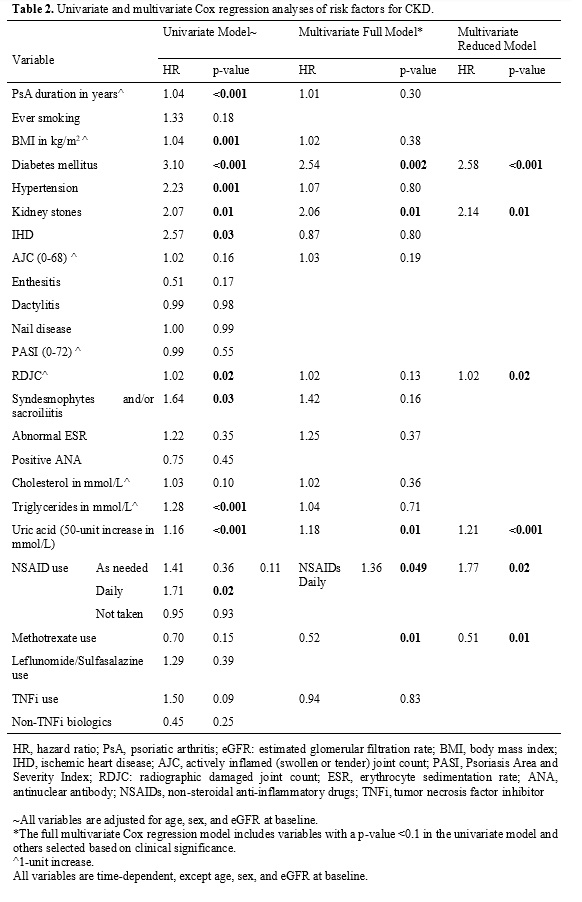Session Information
Date: Monday, November 18, 2024
Title: SpA Including PsA – Diagnosis, Manifestations, & Outcomes Poster III
Session Type: Poster Session C
Session Time: 10:30AM-12:30PM
Background/Purpose: Chronic kidney disease (CKD) is a comorbidity in psoriatic arthritis (PsA). In this study, we aimed to define the prevalence of CKD in patients with PsA, describe their long-term renal outcomes, and identify risk factors for CKD development.
Methods: We included patients with PsA followed at our prospective observational cohort. We defined CKD as an estimated glomerular filtration rate (eGFR) < 60 mL/min/1.73m2 for at least 3 months. We characterized long-term renal outcomes of CKD cases identified following clinic entry. We used time-dependent Cox regression models to identify factors associated with CKD development.
Results: 1336 patients were included in the study, with a mean (standard deviation) age of 44.9 (13.1) years; 746 (55.8%) were males (Table 1). The mean creatinine level at clinic entry was 78.7 (35.4) μmol/L and the mean eGFR level was 98 (19.9) mL/min/1.73m2.
123 (9.2%) patients were observed to have CKD. Of these, 25 (20.3%) had CKD at clinic entry and 98 (79.7%) developed CKD during follow-up at a median [interquartile range] of 8.2 [2.8, 14.0] years from baseline. Doubling of baseline creatinine was observed in 18 of 98 (18.3%) new CKD patients. 49 (50%) patients developed a sustained ≥40% reduction in baseline eGFR. Two patients developed eGFR< 15 mL/min/1.73m2. In the multivariate Cox regression model adjusted for age at study entry, sex, and baseline eGFR (Table 2), factors independently associated with the development of CKD included diabetes mellitus (HR 2.58, p< 0.001), kidney stones (HR 2.14, p=0.01), radiographic damaged joint count (HR 1.02, p=0.02), uric acid level (HR 1.21, p< 0.001; 50-unit increase), daily use of NSAIDs (HR 1.77, p=0.02), and methotrexate use (HR 0.51, p= 0.01).
Conclusion: CKD is not infrequent in patients with PsA. Its development is associated with related comorbidities, joint damage, and NSAID use. Methotrexate use may be protective.
To cite this abstract in AMA style:
Kharouf F, Gao S, Al-Matar S, Pereira D, Cook R, Chandran V, Gladman D. Chronic Kidney Disease in Patients with Psoriatic Arthritis: A Cohort Study [abstract]. Arthritis Rheumatol. 2024; 76 (suppl 9). https://acrabstracts.org/abstract/chronic-kidney-disease-in-patients-with-psoriatic-arthritis-a-cohort-study/. Accessed .« Back to ACR Convergence 2024
ACR Meeting Abstracts - https://acrabstracts.org/abstract/chronic-kidney-disease-in-patients-with-psoriatic-arthritis-a-cohort-study/


